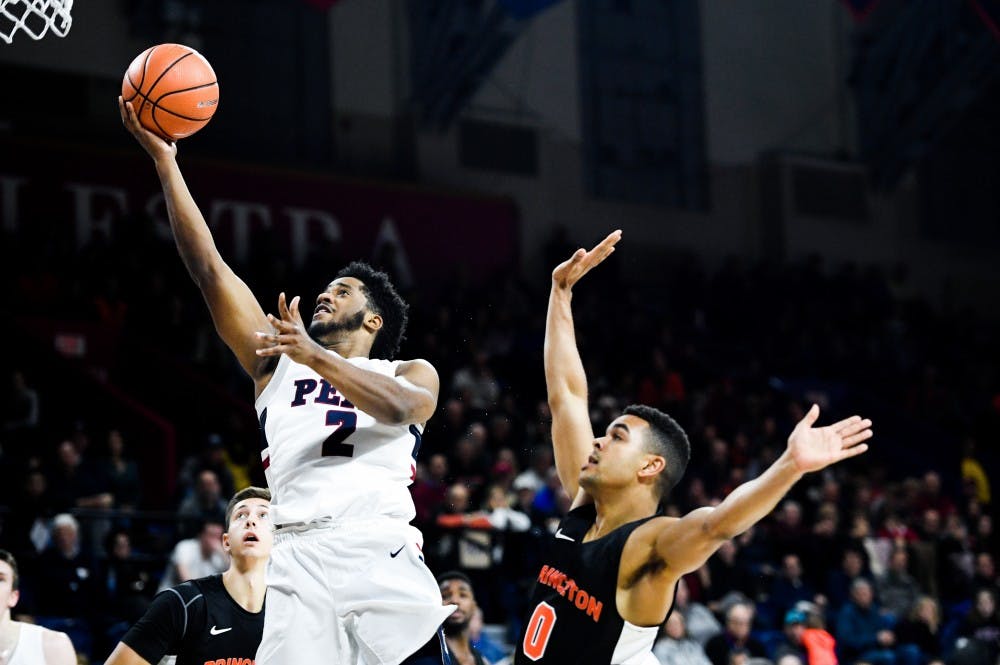
Senior guard Antonio Woods won't get to play rival Princeton in front of any semblance of a student section in his final year.
Credit: Chase SuttonIn the third week of January, when Penn students return to campus for the beginning of the spring semester, they might be looking forward to a lot of different things. For some, that list might include the opportunity to watch Penn men’s basketball compete against archrival Princeton at the Palestra. But by that time, this game will have already been played. And so will the matchup between the two teams at Princeton.
Penn will travel to New Jersey to play the Tigers on Saturday, and next week the Quakers will return to Philadelphia to host their Ivy League foe on Jan. 12. On the surface, this scheduling doesn’t seem to make much sense; looking deeper doesn’t reveal any solid justification either.
For the past six seasons, the Red and Blue have opened their conference slate on a Saturday in early to mid-January against Princeton. Playing one of the two matchups between the teams at this time doesn’t pose much of a problem, especially when the other game is contested mid-week in February, as it has been for two consecutive years. However, playing the games back-to-back over winter break is a poor alternative that opens up a couple of major problems.
First, the scheduling makes it extremely difficult for students of either school to be able to attend. Princeton’s break ends earlier than Penn’s, but its students do not officially return until Jan. 7, two days after the teams compete on their campus. By Jan. 16, when Penn’s spring classes begin, the second game at the Palestra will be over as well.
Eliminating the student section, which this scheduling decision effectively does, takes away the essence of a college basketball game. Anyone who was at the Palestra for the Villanova game can attest to that, and a rivalry as steeped in history as Penn-Princeton deserves the best possible crowd.
This also means that for the second consecutive year, the vast majority of Penn students won’t have a chance to attend one of the most important home games on the schedule, since last season’s game at the Palestra was also over break. That isn’t fair to anyone, and it won’t exactly do much to increase the sometimes-lacking attendance from students at basketball games (or any Penn sports games).
More significantly, scheduling the games back-to-back places too much importance on how the teams are playing at one moment in time. None of Penn’s games against other Ivy League opponents this season are less than two weeks apart, and some, like those against Yale and Brown, are spread out by as much as a month.
There’s a reason why college basketball teams usually don’t play the same conference rival back-to-back. The health and development of individual players evolve throughout a season, as do the strategy and cohesion of a team as a whole. Spreading games out allows these changes to have an impact and deemphasizes the importance of one random week in the regular season in determining a result that should reflect the year overall.
This scheduling move does the opposite. Instead of reflecting how the teams are playing throughout the season, or at least how they are playing in Ancient Eight competition, the Penn-Princeton series will show how good they are in early January, three weeks before the Quakers and Tigers compete in any other Ivy League games.
Penn-Princeton men’s basketball is a historic rivalry. It deserves a pair of great spots on the calendar, regardless of how difficult that might be to achieve. This year, the scheduling has fallen far short of what should be expected.
That isn’t fair to the fans, and more importantly, it isn’t fair to the players.

MICHAEL LANDAU is a Wharton sophomore from Scarsdale, N.Y. and a Sports Editor for The Daily Pennsylvanian. He can be reached at landau@thedp.com.
The Daily Pennsylvanian is an independent, student-run newspaper. Please consider making a donation to support the coverage that shapes the University. Your generosity ensures a future of strong journalism at Penn.
Donate







